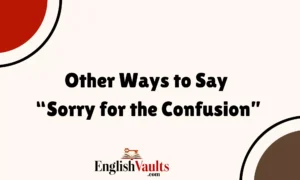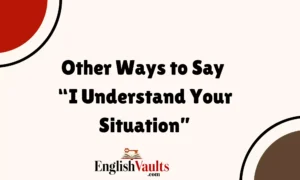When communicating in professional or casual settings, the phrase “please advise” is often used to request guidance or input. However, there are many ways to convey this message, each tailored to fit the context of the conversation. This article explores 27 alternatives to saying “please advise,” complete with scenario examples to illustrate their use. Each alternative is designed to enhance your communication skills while maintaining a friendly and approachable tone.
List of 27 Other Ways to Say “Please Advise”
- Please Let Me Know Your Thoughts
- I Would Appreciate Your Insights
- Could You Share Your Recommendations?
- I’d Love to Hear Your Feedback
- What Are Your Thoughts on This?
- Please Share Your Expertise
- I’d Appreciate Your Guidance
- Can You Provide Your Opinion?
- I Would Love Your Take on This
- Please Provide Your Input
- I Value Your Thoughts on This
- What Do You Think?
- I Would Like Your Thoughts
- Please Advise Me on This Matter
- How Do You Recommend Proceeding?
- I Would Appreciate Your Thoughts on This
- Your Feedback Would Be Greatly Valued
- Could You Weigh In?
- I Would Love to Get Your Opinion
- Please Offer Your Suggestions
- I’m Eager to Hear Your Perspective
- I Need Your Expertise on This
- Your Advice Would Be Appreciated
- I Would Like Your Suggestions
- I Would Appreciate Your Advice
1. Please Let Me Know Your Thoughts
When seeking feedback or opinions, this phrase encourages a thoughtful response.
Email Example:
Subject: Feedback Needed on the Marketing Plan
Hi Leo,
I hope this message finds you well. I’ve drafted a new marketing plan for our upcoming product launch. Please let me know your thoughts on the proposed strategies and any adjustments you might suggest.
Looking forward to your input!
Best, Henry
Addition: This phrase is great for inviting discussion, making it feel more collaborative.
2. I Would Appreciate Your Insights
Using “insights” suggests that you value the recipient’s expertise and perspective.
Email Example:
Subject: Request for Your Insights
Hello Leo,
I am currently analyzing our sales data and would love to hear your perspective. I would appreciate your insights on the trends you’ve noticed over the past few months.
Thanks in advance!
Warm regards, Henry
Addition: This phrasing fosters a sense of respect for the recipient’s knowledge, enhancing professional relationships.
3. Could You Share Your Recommendations?
This approach implies that you are looking for specific guidance or solutions.
Email Example:
Subject: Recommendations Needed for Vendor Selection
Hi Leo,
As we move forward with selecting a vendor for our project, could you share your recommendations based on your previous experiences? Your advice would be invaluable.
Thanks, Henry
Addition: Asking for recommendations can lead to more concrete advice and actionable steps.
4. I’d Love to Hear Your Feedback
This casual yet professional phrase invites a discussion while indicating that you value the recipient’s opinion.
Email Example:
Subject: Seeking Your Feedback
Hi Leo,
I’ve completed the first draft of our proposal and I’d love to hear your feedback on it. Your insights will help ensure we cover all bases.
Best, Henry
Addition: This approach makes the conversation feel more personal and less transactional.
5. What Are Your Thoughts on This?
A direct way to solicit opinions without being overly formal.
Email Example:
Subject: Input Needed on Project Timeline
Hello Leo,
I’ve outlined the project timeline, and what are your thoughts on this? I want to ensure we’re aligned before moving forward.
Thanks for your help! Henry
Addition: This phrase can promote open dialogue and encourage the recipient to share candidly.
6. Please Share Your Expertise
Inviting someone to share their knowledge can help them feel valued and acknowledged.
Email Example:
Subject: Your Expertise Needed
Hi Leo,
I’m facing some challenges with our current project. Please share your expertise on this matter; I know your experience will be beneficial.
Looking forward to hearing from you! Henry
Addition: Highlighting the recipient’s expertise builds rapport and shows you respect their opinion.
7. I’d Appreciate Your Guidance
This phrase expresses gratitude in advance for the help the recipient will provide.
Email Example:
Subject: Guidance Needed for Presentation
Hello Leo,
I’m preparing for an important presentation next week and I’d appreciate your guidance on the key points I should emphasize.
Thank you! Henry
Addition: This phrasing indicates your willingness to receive feedback and encourages a supportive response.
8. Can You Provide Your Opinion?
A straightforward request that’s clear and direct.
Email Example:
Subject: Request for Your Opinion
Hi Leo,
I’m in the final stages of the report, and I value your input. Can you provide your opinion on the conclusions I’ve drawn?
Thanks for your assistance! Henry
Addition: This option is effective when you need a clear response quickly.
9. I Would Love Your Take on This
A more casual way to ask for someone’s perspective.
Email Example:
Subject: Need Your Take
Hello Leo,
I’ve been considering a few different strategies for our outreach campaign, and I would love your take on this before we finalize anything.
Best, Henry
Addition: Using “take” makes the request feel more informal and approachable.
10. Please Provide Your Input
A direct and respectful way to ask for someone’s thoughts.
Email Example:
Subject: Request for Your Input
Hi Leo,
We’re making some updates to the company policy and please provide your input on the changes. Your experience will help us create a more effective policy.
Thanks! Henry
Addition: This phrase emphasizes the importance of the recipient’s contribution.
11. I Value Your Thoughts on This
This expression reinforces the importance of the recipient’s feedback.
Email Example:
Subject: Request for Your Thoughts
Hi Leo,
I’ve drafted a new team structure and I value your thoughts on this. Your perspective will be key in ensuring we have a solid approach.
Thank you! Henry
Addition: This phrasing builds trust and encourages a deeper level of engagement.
12. What Do You Think?
A simple yet effective way to ask for feedback, suitable for informal communication.
Email Example:
Subject: Quick Feedback Needed
Hi Leo,
I’m contemplating a few changes to our workflow. What do you think would work best for the team?
Cheers, Henry
Addition: This informal approach can create a relaxed atmosphere for feedback.
13. I Would Like Your Thoughts
A formal request that maintains professionalism.
Email Example:
Subject: Thoughts Requested
Hello Leo,
I’m finalizing the agenda for the upcoming meeting and I would like your thoughts on the topics to be included.
Best regards, Henry
Addition: This phrasing is useful when addressing senior colleagues or clients.
14. Please Advise Me on This Matter
A variation that maintains the original phrase’s intent while adding a personal touch.
Email Example:
Subject: Your Advice Needed
Hi Leo,
I’m navigating some complexities in the project timeline. Please advise me on this matter, as I value your input greatly.
Thanks in advance! Henry
Addition: This keeps the request respectful and acknowledges the recipient’s expertise.
15. How Do You Recommend Proceeding?
Asking for recommendations can lead to actionable advice.
Email Example:
Subject: Need Your Recommendations
Hi Leo,
I’m unsure about the next steps in our negotiation process. How do you recommend proceeding to achieve the best outcome?
Thanks for your guidance! Henry
Addition: This question can open the door to strategic thinking and planning.
16. I Would Appreciate Your Thoughts on This
A variation that emphasizes gratitude for the recipient’s insights.
Email Example:
Subject: Seeking Your Thoughts
Hello Leo,
As we prepare for the upcoming launch, I would appreciate your thoughts on this marketing strategy to ensure it aligns with our goals.
Best, Henry
Addition: This approach shows respect for the recipient’s time and effort.
17. Your Feedback Would Be Greatly Valued
This phrase emphasizes the importance of the recipient’s feedback.
Email Example:
Subject: Feedback Request
Hi Leo,
I’m drafting a proposal and your feedback would be greatly valued to enhance its effectiveness.
Thank you! Henry
Addition: Expressing that feedback is valued can lead to more thoughtful responses.
18. Could You Weigh In?
An informal and friendly way to ask for input.
Email Example:
Subject: Weigh In on the Design
Hi Leo,
I’ve been working on a new design for our website. Could you weigh in with your thoughts? I’d love to get your perspective.
Cheers, Henry
Addition: This approach invites collaboration and can foster creativity.
19. I Would Love to Get Your Opinion
A friendly way to engage someone in the conversation.
Email Example:
Subject: Seeking Your Opinion
Hello Leo,
As we finalize our budget, I would love to get your opinion on the proposed allocations.
Thank you! Henry
Addition: This phrasing makes the request feel personal and engaging.
20. Please Offer Your Suggestions
This phrase is clear and encourages the recipient to provide constructive feedback.
Email Example:
Subject: Suggestions for Improvement
Hi Leo,
I’m reviewing our current processes and please offer your suggestions on how we can improve efficiency.
Looking forward to your thoughts! Henry
Addition: Inviting suggestions can lead to innovative solutions.
21. I’m Eager to Hear Your Perspective
Expressing eagerness can create a positive tone.
Email Example:
Subject: Your Perspective Needed
Hello Leo,
I’m drafting a proposal for a new project and I’m eager to hear your perspective before finalizing it.
Best, Henry
Addition: This phrase shows enthusiasm for collaboration and fosters a positive atmosphere.
22. I Need Your Expertise on This
Directly acknowledging someone’s expertise can be very effective.
Email Example:
Subject: Expertise Required
Hi Leo,
I’m currently evaluating our software options, and I need your expertise on this. Your insights will be invaluable.
Thanks for your help! Henry
Addition: This shows respect for the recipient’s knowledge and encourages a prompt response.
23. Your Advice Would Be Appreciated
A polite way to indicate that the recipient’s input is valued.
Email Example:
Subject: Request for Your Advice
Hello Leo,
I’m considering a few options for our next marketing campaign, and your advice would be appreciated as I make this decision.
Thank you! Henry
Addition: This phrasing maintains professionalism while encouraging input.
24. I Would Like Your Suggestions
A straightforward approach that is respectful and clear.
Email Example:
Subject: Suggestions for the Event
Hi Leo,
As we plan the upcoming event, I would like your suggestions on potential speakers or activities to include.
Thanks! Henry
Addition: This approach keeps the lines of communication open and encourages constructive feedback.
25. I Would Appreciate Your Advice
Similar to previous phrases, this conveys gratitude while asking for input.
Email Example:
Subject: Seeking Your Advice
Hi Leo,
I’m exploring options for our team retreat and I would appreciate your advice on venues and activities that you think would be effective.
Best, Henry
Addition: Emphasizing appreciation can enhance the likelihood of receiving thoughtful responses.
26. Please Provide Your Assessment
This formal phrase requests a more in-depth evaluation.
Email Example:
Subject: Request for Your Assessment
Hello Leo,
As we prepare for the quarterly review, please provide your assessment of our team’s performance over the last few months.
Thanks! Henry
Addition: This encourages thorough feedback and can lead to more informed decisions.
27. How Do You Suggest We Proceed?
This question implies that you are open to various strategies and plans.
Email Example:
Subject: Next Steps Discussion
Hi Leo,
We’ve completed the initial phase of the project. How do you suggest we proceed from here to ensure we stay on track?
Thank you for your guidance! Henry
Addition: This invites collaboration and shows a willingness to consider different approaches.










